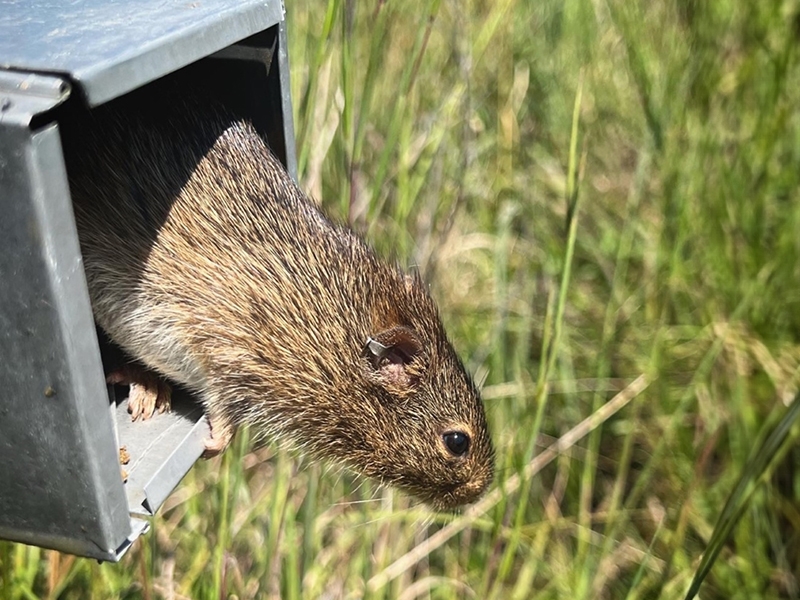
Biologists at the U of A have discovered a new virus that belongs to a family of viruses that transfers from rodents to humans, some of which cause a fatal cardiopulmonary disease.
Ozark orthohantavirus, or simply Ozark virus — because it was found in hispid cotton rats captured in grasslands of the Ozark Plateau — is phylogenetically related to other orthohantaviruses that cause severe human disease.
“This is the first orthohantavirus detected in Arkansas and the second definitive orthohantavirus species to be identified in hispid cotton rats from across the U.S.,” said Kristian Forbes, associate professor of biological sciences. “Significantly, because Ozark virus is closely related to other viruses that cause severe disease in people, our discovery provides crucial public health information.”
Forbes’ research focuses on developing strategies to detect and intercept zoonotic diseases, diseases such as COVID-19 and HIV that begin in animals but spill over into humans. His research program focuses on high-risk virus groups in bats and rodents in the United States, Europe and Africa.
The Ozark virus study was conducted primarily by his doctoral student, Nathaniel Mull, who is now an assistant professor at Shawnee State University in Ohio. Mull and Forbes analyzed lung samples from hispid cotton rats that they captured during 2020 and 2021 in the Ozark Plateau region of Arkansas. Of 338 rat samples, 26 tested positive for Ozark virus.
Hispid cotton rats thrive in grassland and agricultural habitats. Despite their wide distribution in North America, previously published surveillance and detection of orthohantaviruses in these rodents had been limited to only Florida and Texas.
Found primarily in rodents, some orthohantaviruses are pathogenic in humans and cause hantavirus cardiopulmonary syndrome (HCPS), a disease with a 30% to 40% fatality rate. At least one HCPS case has been recorded in Arkansas.
“Continued surveillance is needed to address the potential public health threat of Ozark virus throughout Arkansas and the distribution range of the hispid cotton rat host,” Forbes said.
The researchers’ study was published in the December issue of Emerging Infectious Diseases, the journal of the Centers for Disease Control and Prevention.
About the University of Arkansas: As Arkansas' flagship institution, the U of A provides an internationally competitive education in more than 200 academic programs. Founded in 1871, the U of A contributes more than $2.2 billion to Arkansas’ economy through the teaching of new knowledge and skills, entrepreneurship and job development, discovery through research and creative activity while also providing training for professional disciplines. The Carnegie Foundation classifies the U of A among the few U.S. colleges and universities with the highest level of research activity. U.S. News & World Report ranks the U of A among the top public universities in the nation. See how the U of A works to build a better world at Arkansas Research and Economic Development News.
Topics
Contacts
Kristian Forbes, assistant professor of biological sciences
Fulbright College of Arts and Sciences
479-575-3797,
Matt McGowan, science and research communications officer
University Relations
479-575-4246,